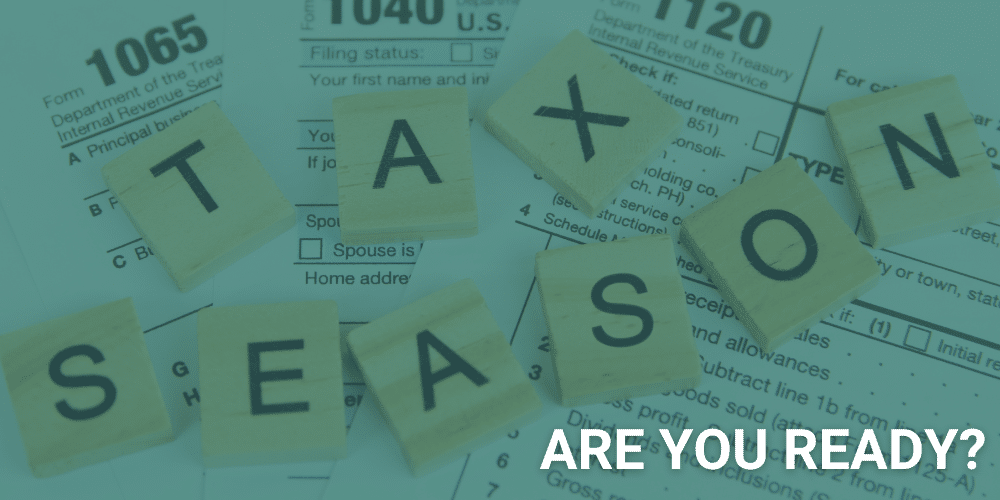As we head into tax season, you may be starting to navigate the intricate landscape of tax preparation. Avoiding taxes is not an option, but making the process as stress-free as possible is. If you’re already working with a tax accountant, chances are you’ve likely received your 2023 tax prep checklist. If you’re navigating tax season yourself or want to get a jumpstart on gathering your info, here’s a list of what you need…
Individual Tax Preparation Checklist
The goal every tax season is to file the most accurate return while minimizing your tax obligations by ensuring you get the most tax deductions you’re eligible to receive. In order to do that, you’ll need to gather some documents before you get started…
- Last year’s tax returns. Use them as a reference for what you filed last year and what documents you used to file.
- W-2s for all places of employment.
- All 1099 forms for interest, dividends, retirement, miscellaneous income, unemployment compensation, nonemployee compensation, Social Security, state or local refunds, gambling winnings, payment card of third party network transaction, etc.
- Brokerage statements showing investment transactions for stocks, bonds, digital assets, etc.
- Schedule K-1 showing income from partnerships, S corporations, estates and trusts.
- Statements and receipts supporting qualified educational expenses, deductions or distributions, including any Forms 1098-T, 1098-E, or 1099-Q.
- Statements from U.S. Department of Education supporting federal student loan forgiveness.
- All Forms 1095-A, 1095-B, and/or 1095-C related to health care coverage or the Premium Tax Credit.
- All Forms 1099-QA and/or 5498-QA related to ABLE (Achieving a Better Life Experience) account.
- All Forms 1099-H related to Health Coverage Tax Credit (HCTC) advance payments.
- Statements supporting deductions for mortgage interest (Forms 1098), taxes, and charitable contributions (including any Form 1098-C).
- Statements supporting the receipt, exchange, sale, use, or any other disposition of a digital asset.
- Copies of closing statements regarding the sale or purchase of real property.
- Legal papers for adoption, divorce, or separation involving custody of your dependent children.
- Six-digit Identity Protection PIN for use during calendar year 2023, if sent to you by the IRS.
- Any tax notices sent to you by the IRS or other taxing authority.
Deductions and Credits
It’s important that you identify and leverage any deductions you are eligible for that can help to lower your taxable income. Common deductions include mortgage interest, student loan interest, medical expenses and local taxes. Deductions can significantly impact the amount of taxes you owe or refund you receive.
Available Tax Credits
Since tax credits directly reduce your tax liability, they can be valuable opportunities. Available tax credits include the child tax credit, education credits and energy-efficient home improvement credits. Explore the tax credits available to you so you can be sure to take full advantage of the potential savings.
Expenses and Receipts
Medical Expenses
Certain medical expenses may be deductible so keep a record of all your medical expenses including doctor visits, prescription costs and health insurance premiums. They may just help to lower your taxable income.
Charitable Contributions
Charitable contributions can be deducted, but you need to make sure that you have proper documentation to support your contribution. Proper documentation can include receipts and acknowledgement letters. Keep in mind, your documentation must be dated at the time of donation.
Business-Related Expenses
If you have a side hustle, you may have incurred business-related expenses during the year. Those expenses may include home office expenses, business travel, and costs associated with running your business.
Record-keeping Tips
Establish a system for organizing and storing your financial records that you gather throughout the year. Soon forms will start popping up in your mailbox and inbox so it’s important to keep all your documents in one place. Efficient record-keeping is the foundation for successful tax preparation.
Working with a Tax Accountant
While you can certainly navigate tax season on your own, it is much easier with the help of a seasoned professional. In addition to saving you time and relieving the stress that accompanies tax season, a tax professional can provide expert advice, identify potential deductions you may not be aware of and ensure compliance with the ever-changing tax laws.
How to Prepare for a Meeting with Your Tax Accountant
Before your meeting, gather all of your necessary documentation including your W-2s, any 1099 forms, any forms that support deductions or credits you’re eligible for, expense receipts for any deductible expenses and your previous year’s tax return. Make a list of any questions or concerns you have about your tax situation and any life changes that happened throughout the year that could affect your tax liability.
You’ll not only streamline the meeting with your tax accountant, but you’ll also contribute to a more thorough and personalized assessment of your tax situation. You’ll be making the most of your time together, addressing specific concerns you may have and optimizing your individual tax strategy.
Final Thoughts
By staying organized, informed and proactive as tax season approaches, you can head into tax season with ease. Your proactive approach to preparing for tax season makes the filing process smoother and empowers you to make informed decisions about your financial future.
Ready to schedule a meeting with our tax professionals? Contact us today.


Recent Comments